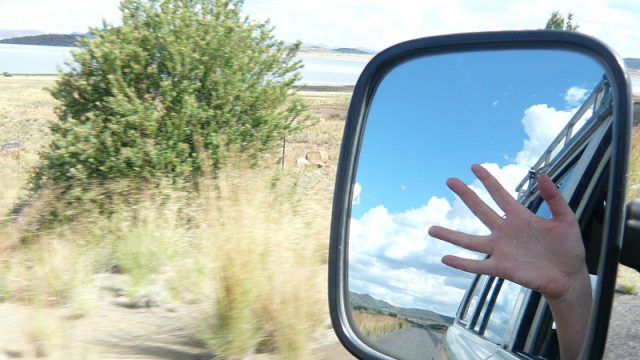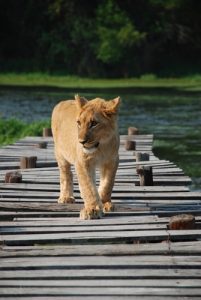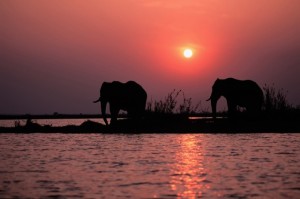I’d always wanted to visit Zimbabwe, and despite having lived within a day’s drive of its border (in Johannesburg) for most of my life, I’d never gone. A big reason is that the last decade has seen the country suffer political and economic turmoil, and it’s only in recent years Zimbabwe that has recovered to the point that it’s safe and stable for travellers.
So when the possibility of a road trip with friends over the New Year’s summer holiday came up, I jumped at the chance to go. A converted khaki-colored game-viewing Land Cruiser (with extra-large windows and a great sound system) packed with beers, tents, sleeping bags and a box load of compilation CDs was to be our trusty steed for 1500 miles of tarmac.
Our route began in Johannesburg and led north through Limpopo Province against a backdrop of heavy grey summer thunderstorm clouds, with a first night stop in Tshipise, at a sprawling campsite with hot pools packed with families. The next day, after a crack-of-dawn wake up, we reached the Beitbridge border post in an hour and had a quick and friendly crossing, brushing off the cheerful request for bribes from the border police with jokes (so far, this has been my infalliable bribe-avoiding strategy travelling through 14 African countries).
A couple of hours on the road later, driving through a scenic landscape of valleys and hills dotted with baobabs, we arrived at the Great Zimbabwe ruins and paid to pitch our tents at the campsite. The man working at reception was so happy to see us, he offered a discount on the already cheap rates. This was to become a theme throughout the trip – incredibly friendly, welcoming people so eager and proud to welcome tourists back in their beautiful country. While some people debate the ethical issues around visiting Zimbabwe because of the political situation, it’s hard to ignore the fact that so many people in the country are heavily reliant on tourist dollars.
The next morning, after an early campfire breakfast, we wandered down to the Great Zimbabwe ruins and hired a guide at the entrance (for US$3 per person) to take us around. The 1000-year-old ruined city, protected as a UNESCO World Heritage Site, was the capital of the Kingdom of Zimbabwe, which stretched from eastern Zimbabwe to Botswana, Mozambique and South Africa. It’s Zimbabwe’s greatest archaeological treasure, and a truly breathtaking sight to see – an area of nearly 2000 acres strewn with huge stone walls, curving passageways, towers and the crumbling remains of palaces – but we were the only people there. It was incredibly special to have such a magical place all to ourselves, but we couldn’t help feeling sad about how few tourists there were to keep this site going.
I could have spent a few days exploring the ruins and soaking up the deep quiet, but the road beckoned on to Gweru, in Zimbabwe’s midlands. Here we decamped to Antelope Park for a few days, where we drank gin and tonics on shady lawns leading down to a peaceful river, went on bush walks and horse rides through the 3000-acre reserve which is populated with giraffe, zebra, and wildebeest, did some canoe paddling, and enjoyed prolonged sundowner sessions.
Refreshed and ready for the next leg, we hit the road again and wound our way on a bendy beautiful road to Lake Kariba to reach our last stop: the 50-sleeper Zambezi Trader houseboat, where we were going to see in the new year. We unpacked our bags and left the car on the shore, checking into our cozy cabins just before the boat set sail. Sitting on the top deck under the brilliant sunshine, ice-cold Zambezi beers in hands, as we cruised towards the middle of the lake, we had one of those travel ‘peak moments’ where it seemed like life couldn’t get better.
The days that were to follow were the highlights of the trip. Many happy hours were spent lazing in the hammocks on deck, watching Kariba’s glorious lakeside landscapes glide past (and spotting the occasional elephant), working our way through thick holiday books and playing card games. In between we went fishing for sharp-toothed tiger fish, went on wildlife and bird-spotting cruises on small tender boats to see herds of elephant and pods of hippos, and braved the croc-infested water to jump off the top of the boat into the lake. All 50 guests got together to party on the deck until the early hours of January 1st, seeing in the new year with a bang – and a lot of sparkling wine.
Even though the long drive back to Johannesburg (with stopovers in Zimbawbe’s laidback capital Harare and the Lion and Elephant Motel — a great pitstop 80 km from the Beitbridge border) was marred by a few $20 speeding fines and a burst tire, we couldn’t wipe the big grins off our faces after such a wonderful journey through a beautiful, friendly country. For my first time in Zimbabwe, I couldn’t have asked for a better holiday.
Where to stay
- Forever Resorts Tshipise, a family-friendly campsite resort with excellent amenities.
- Great Zimbabwe Hotel: If you don’t want to camp at the ruins, this lovely hotel is your best option.
- Antelope Park: A private game park with a range of accommodation from camping to lodges.
- Zambezi Trader: A luxury 50-sleeper houseboat with great food, a swimming pool and tender boats for fishing and game viewing cruises.
- Lion and Elephant Motel: Comfortable and clean accommodation and restaurant near the South African border.
Petrol
In the past there have been fuel shortages in Zimbabwe. We didn’t have a problem on our trip, but we did take jerry cans with extra petrol just in case.
Money
Zimbabwe uses the US dollar as its currency, but South African rands are also accepted. Usually there’s not much change available, so take as many small notes ($1 and $5 bills) as you can. Make sure your dollars are newer — they won’t accept any minted before 2001.




